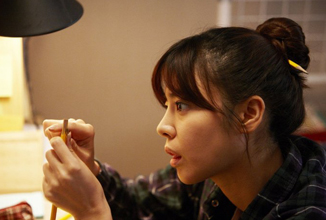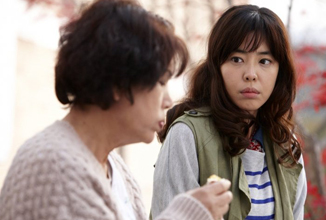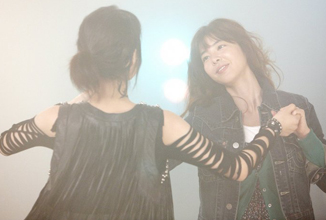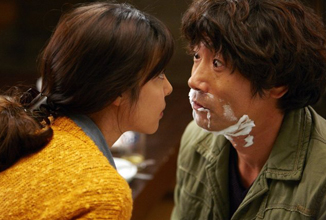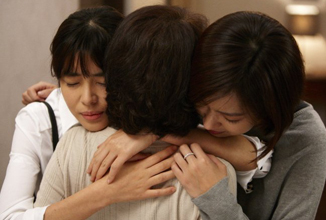
 |
||||||
Synopsis: Jin-young (Kim Gyoo-ri) is a would-be scriptwriter whose insistence on writing stories with zombies as the main characters repeatedly results in, at best, her work being rejected; at worst, her being physically ejected from film company offices more often than not with her scripts thrown after her. Difficult though Jin-young finds these rejections, her lack of success in her chosen profession almost pales into insignificance when compared to her private life - or more accurately her lack of one - for though she's in her thirties Jin-young is still a virgin and in fact has never even had her first kiss.
On being told by her doctor that her repeated stomach cramps and 'menstrual irregularities' are likely a sign of early onset menopause, Jin-young is forced to face the reality that any chance of having a normal, traditional life is quickly slipping away but with the arrival of Tae-il (Park Won-sang) in her life - a man she knew in college who is now a director - that very chance to sort out her private life, as well as finally getting her zombie script made into a film, seems to present itself in the nick of time. However, before Jin-young can even start to figure out if she really wants more than friendship from Tae-il, Jamie (Jeon Soo-jin) - a friend of Jin-young's stepsister (Choi Yoo-hwa) - raises a sexual question that even Jin-young couldn't have seen coming...
Review: As with - or, more accurately, as a natural extension of - romance and melodrama, romantic comedy has been a continuing staple of Korean Cinema for many years; largely brought to prominence as a result of being deemed one of the few 'safe' genres for film-makers to create content during the period of Park Chung-hee's severe governmental censorship of cinematic subject matter (including changes to the Motion Picture Law in 1973 that resulted in the banning not only of narratives critiques of political and social issues and any overt sexual references but also required films to reflect Park's 'Revitalising Government') and further fuelled by the relative ease with which stories of love and laughter resonated with audiences. However, reassuringly comfortable and comforting though these humorous, and more often than not generic, depictions of love and relationships were to audiences advocating and/or aiming for fairly traditional lives (happiness through marriage; female fulfilment through family commitments; etc.), they largely failed to strike a chord with the younger Korean demographic - an audience as sought after by as it was elusive to Korean cinema - even once censorship had greatly eased under successive governments.
Just as 'My Sassy Girl' detailed a feisty (sweetly psychotic) heroine at a time when post-adolescent Korean women were beginning to consider themselves as free thinking individuals rather than being defined by their position within a relationship or their adherence to traditional societal norms, and 'My P.S Partner' underlined young Korean adults increasingly seeing sex as much as a source of pleasure in its own right as the means of procreation, 'My Dear Girl, Jin-young' centres its basic premise around the growing number of Korean females leaving relationships and/or marriage till much later in life choosing instead to focus on the pursuit of a career. Not only that, but within its warm and genuinely funny story open references to alternative lifestyles - namely same sex relationships - appear on more than one occasion; deftly linked to Westernisation (more on this shortly), in the process. 'My Dear Girl, Jin-young' begins in a similar manner to the opening of the aforementioned 'My Sassy Girl'; a flashback scene to various events in Jin-young's youth narrated by our heroine herself. However, reminiscent though it may be, this first scene has its own originality both visually - playing in grainy black and white with playful piano accompaniment and feeling like an old, silent movie comedy/farce - and in narrative reasoning - the story of the heartaches leading to Jin-young's failure in adult life initially appearing to be whimsical statements of fact but later showing themselves to be more Jin-young's warped (and largely inaccurate) memories of childhood. As such, in the very first moments of 'My Dear Girl, Jin-young' we are pointed towards one of the film's major themes, even if we don't realise it at the time: Jin-young is convinced that her current failures stem directly from being abandoned by her mother - thereafter becoming a stepdaughter to her father's new wife (and therefore being less important than the woman's child by birth) - and from constantly having everything she wants (clothes, possible boyfriends, and love) stolen from her by her stepsister; all adding up to her subconscious belief that as that's the way things have always been it's the way they'll always continue. As such, her character arc perfectly underlines the film's ultimate questions of whether our past directly affects our present and future; if our perceptions are unknowingly twisted by our psyche to serve as an excuse for our failures; and if a simple change in attitude can result in a dramatic change in fortune.
Thought provoking though these questions unquestionably are, let's not forget that the successful realisation of a rom com's humour and warmth - its romance and comedy - is vital to making a narrative engaging and watchable enough to allow the depiction of worthy commentary and in this respect too 'My Dear Girl, Jin-young' accomplishes its goals with aplomb: From Jin-young's repeated dreams of being dead in a church casket arguing with the clergyman reading her eulogy (citing her every failure, in the process); to her conscious conversations with the zombie characters in her script; to her picturing her stepsister's friend Jamie as the feisty zombie hunter of her story; each is genuinely funny and affecting with every single character showing weird and wonderful eccentricities - all from, again, Jin-young's perspective. Not only are these elements intelligently thought out and perfectly stated but they're also (seemingly effortlessly) layered to allow the mixing of humour with the aforementioned themes. For example, Jin-young taking up the home tuition of two schoolgirls who are the daughters of a shaman, the younger of whom regularly channels the spirit of the 'Celestial Fairy' who, in turn, endlessly criticises Jin-young's life, choices and fears. The sight of a school-aged child berating Jin-young for not dating and never having had sex - screaming "You've never had sex? Are you kidding? You're over 30! Wake up, girl!" - is a laugh-out-loud sight to behold at the same time as perfectly leading Jin-young back to the serious theme-based task of finding a way to change her life. Cast: Kim Gyoo-ri, Park Won-sang, Choi Yoo-hwa, Jeon Soo-jin Summary: 'My Dear Girl, Jin-young' deftly stands as one of the latest cinematic examples to show just how far the Korean Romantic Comedy genre has come over the years in its depictions of relationships, social issues and sexuality; the film's intelligently realised themes beautifully wrapped up in a warm and genuinely funny, zombie filled tale.
'My Dear Girl, Jin-young' (사랑해! 진영아 / 2013 - directed by Lee Seong-eun)
|
||||||
All images © Indiestory Inc., Indieplug, Redrover Review © Paul Quinn |
||||||
